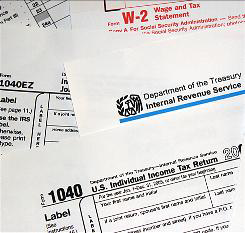It's tax time, and that means busy days for many tax professionals, and many errors and mistakes by individuals who choose to prepare their own taxes.
One thing is certain, though: Taxpayers have a lot of questions when it comes to taxes, and there are many myths that float around this time of year. In an effort to help taxpayers be better prepared, the National Association of Enrolled Agents has put together a list of the most common taxpayer misconceptions.
“My uncle has a foreign bank account and I’m also a signer on it – but he owns the account. I don’t have to disclose this information on my tax return since I don’t own the account.” Full disclosure of foreign accounts is an area that is under heavy scrutiny right now. There are several factors in determining disclosure of these accounts/assets. The penalties for failure to disclose are severe.
“My broker sold some stock this year and reinvested the money in another stock – I never got any money, so it’s not taxable, right?” Stock sales (outside of retirement accounts) are required to be reported. Gain or loss on each individual stock transaction stands on its own. Sales of mutual funds also apply here.
“I don’t have to pay taxes on my Social Security benefits.” Unfortunately, Social Security benefits may be required to be included in income. The amount, if any, is based on the amount of all other income as required to be reported on the tax return. The maximum amount of Social Security benefits that may be included in income is 85 percent.
“I own an S Corporation and was told I can take dividends in lieu of wages and save myself payroll taxes”. In regard to monies paid to shareholders/employees of an S Corporation, reasonable compensation must be paid before any dividends or loan repayments are permitted. Failure to properly report wages could result in a reclassification of the dividends/loan repayments as wages and subject you to penalties.
“I am a student who only works part-time, so I don’t have to file a tax return.” In addition to age, tax filing requirements are reliant on filing status, dependency status, amount of income and whether it is earned or unearned. Student status is not a factor.
“My relative lives in one of my rentals but pays little if any rent. I can still treat it as a rental since I have so many expenses.” Renting to relatives at amounts below fair market rental value is subject to limitations in that expenses cannot exceed income. There may be other limitations as well. The Tax Court has suggested that for a family member, a fair rent may be up to 20 percent less than market rent.
My wife and I separated last year and lived apart for most of the year. I should be able to file Single now, correct?” Couples who are not legally divorced or separated as of the end of the year are precluded from filing Single.
Unfortunately, taxpayers who prepare their own returns or deal with unlicensed preparers may fail to include important information simply because they overlook it, a document was never received, or more commonly, just from lack of knowledge of the tax laws.
Another taxpayer misconception is that tax preparers simply fill out forms and push a button. The real value of licensed professionals is that they keep up with countless tax laws and regulations and have the expertise to know how to apply these rules for the benefit of the taxpayer. A good preparer will provide you with a checklist that will help reveal missing documents or information so that a complete and accurate tax return is prepared. It is important to note that no matter who prepares your taxes, you are the one who is legally responsible for what’s on your return—making it even more important to hire a licensed tax professional.
——————-
(List from National Association of Enrolled Agents.)
Thanks for reading CPA Practice Advisor!
Subscribe Already registered? Log In
Need more information? Read the FAQs
Tags: Income Taxes, Software, Taxes




